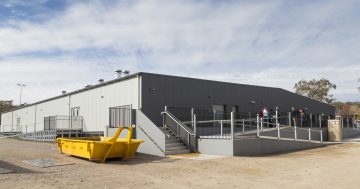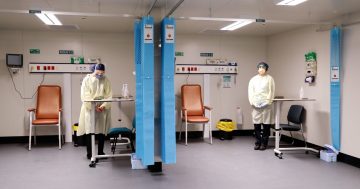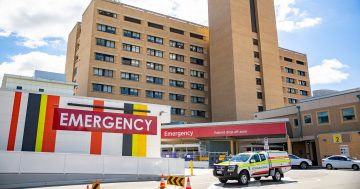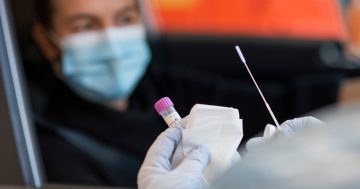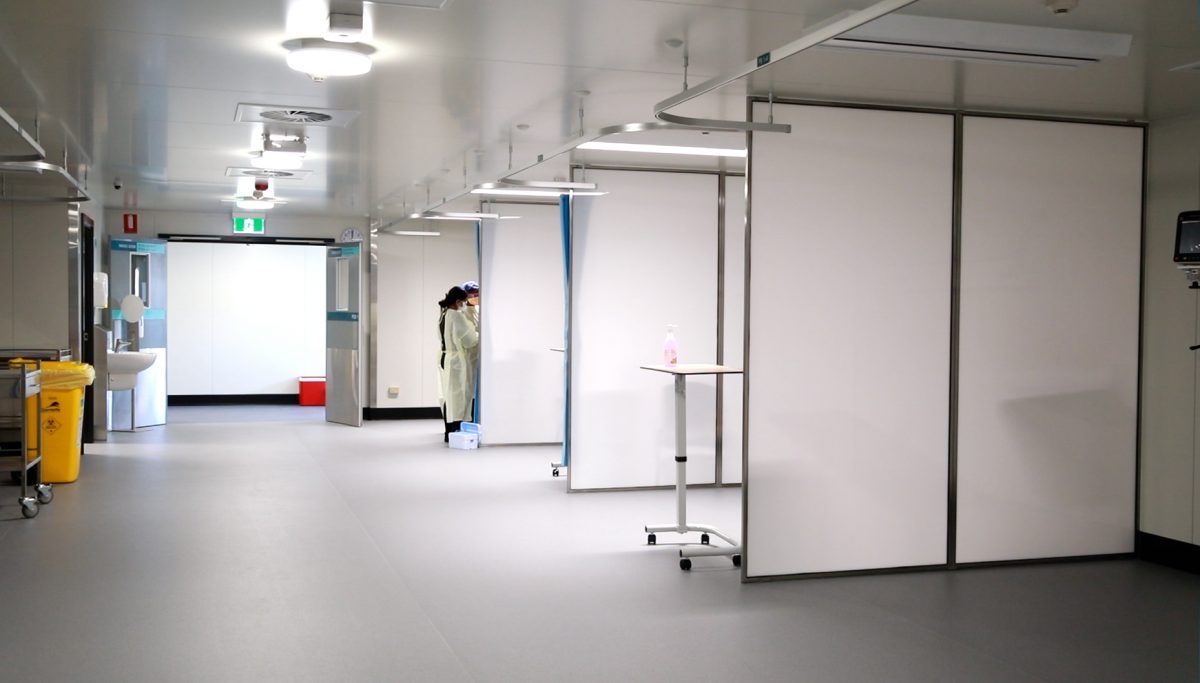
The government is preparing to dismantle the Garran Surge Centre. Photo: Michelle Kroll.
The last remnants of the COVID-19 pandemic response will start to disappear next week when the ACT Government gives up its emergency powers and prepares to dismantle the Garran Surge Centre.
This means there’ll be no need to report a positive Rapid-Antigen Test (RAT) result to ACT Health, and PCR tests will be available by referral only from 1 March 2023.
The Garran Surge Centre at the Garran Oval (opposite the Centenary Hospital for Women and Children) will permanently close from 28 February. The government says dismantling the 1700 sqm demountable and restoration of the grounds “will take time”, with no detailed timeline available at this stage.
The facility was constructed in 2020 in just 36 days at a cost of $14 million as a “temporary COVID-19 emergency department” in the wake of overwhelmed health systems overseas.
However, it was never used for that purpose and instead morphed into a vaccination clinic and walk-in clinic for people with COVID.
ACT Health Minister Rachel Stephen-Smith said the students at the nearby Garran Primary School can now look forward to “getting their oval back”.
“The Garran Surge Centre has served the Canberra community well, conducting more than 240,000 PCR tests throughout the pandemic and providing free RATs,” she said.
“On behalf of the entire ACT community, I would like to thank every staff member who has been involved in the set-up and operation of the Surge Centre. Healthcare staff have worked incredibly hard throughout COVID-19 to provide safe, accessible and effective testing for our community.”
In another step towards managing COVID like any other infectious disease, the ACT Government has dropped the ‘Management Declaration’.
This was implemented in May 2022 when the state of emergency expired for the last time. Under Part 6C of the Public Health Act 1997, the framework allowed the ACT’s Chief Health Officer and Health Minister to mandate COVID testing and vaccination, quarantine, mask-wearing and social distancing measures at any time.

ACT Health Minister Rachel Stephen-Smith outside the Garran Surge Centre in February 2021. Photo: Michelle Kroll.
The only remaining direction under the declaration requires people who test positive using a RAT to report the result to ACT Health. The ACT is the only Australian jurisdiction still to have this legal requirement, but the Chief Health Officer has concluded that it’s “no longer justified”. Canberrans are now only “strongly encouraged” to report their results.
“This is a planned step in our ongoing public health response to COVID-19 as we transition to managing COVID-19 outside of emergency arrangements,” Ms Stephen-Smith said.
“While our formal government emergency management mechanisms are changing, the ACT Government will continue to support Canberrans in practical ways and we encourage everyone to maintain their ‘COVID Smart’ behaviours. That includes adults getting a booster vaccination if it’s been six months or longer since their last COVID-19 booster or confirmed infection.”
From 1 March, Canberrans can collect free RATs from several ACT Government locations, including ACT Libraries (excluding the Heritage Library), Access Canberra service centres, and all Canberra Health Services facilities (hospitals, Walk-in Centres and health centres).
The Community Services Directorate will also continue to provide free RATs for non-government organisations in line with current arrangements.
Ms Stephen-Smith said RATs are still one of the easiest and fastest ways to diagnose COVID.
“Be prepared ahead of time by having RATs at home to use if you get symptoms or are visiting a relative or friend who would be vulnerable to serious illness if they got COVID,” she said.
“Most Canberrans can use a RAT in their own home and receive a result within minutes. If you do test positive, it remains important to take the appropriate steps to look after yourself, manage your infection and protect others.”
Also from 1 March, Canberrans will need a referral from a GP or health professional to access a PCR test. The test will be free for concession card holders, with a list of participating pathology centres to go live on the ACT COVID-19 website in the coming days.
More information on these changes is available at www.covid19.act.gov.au.












